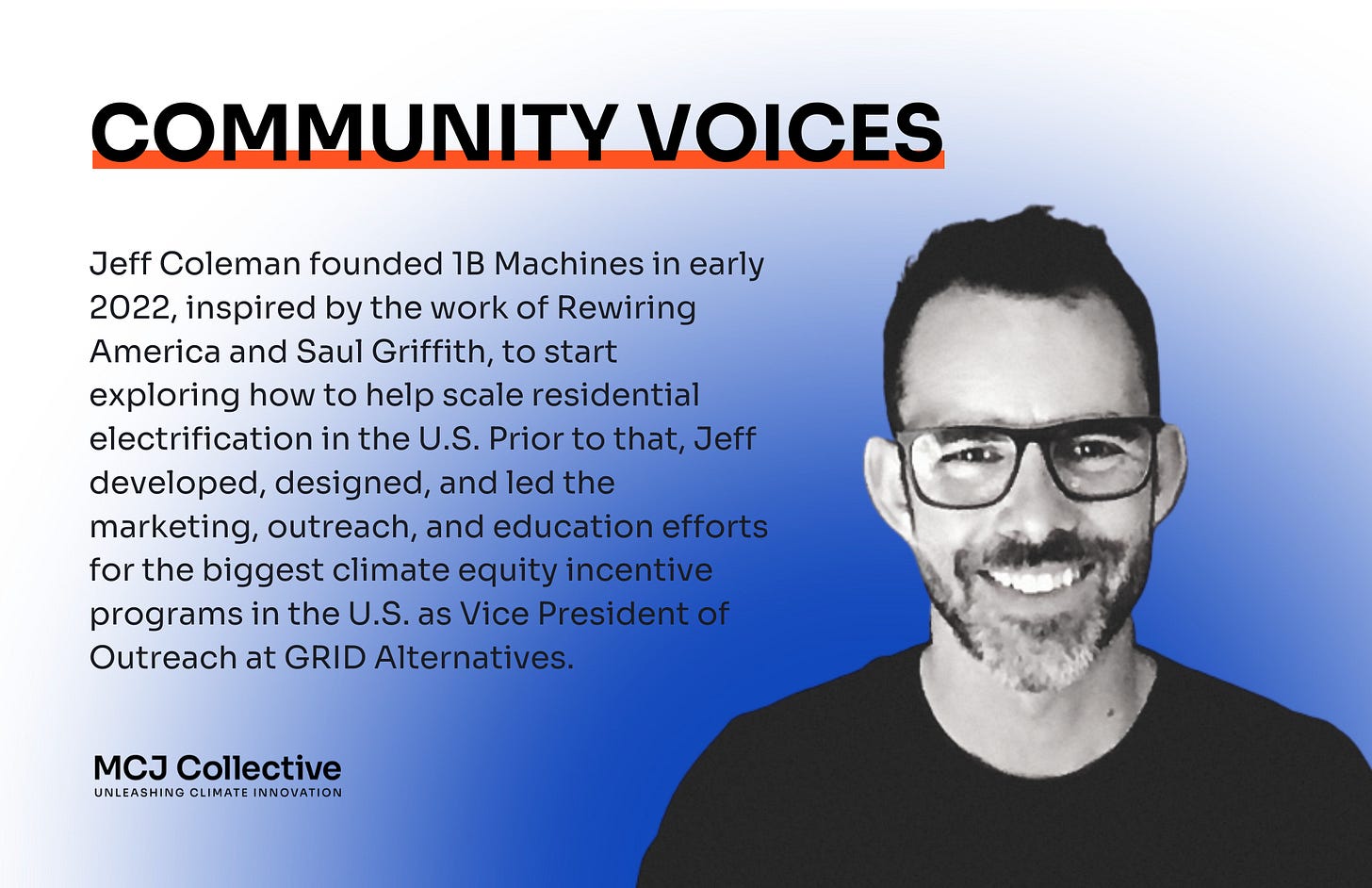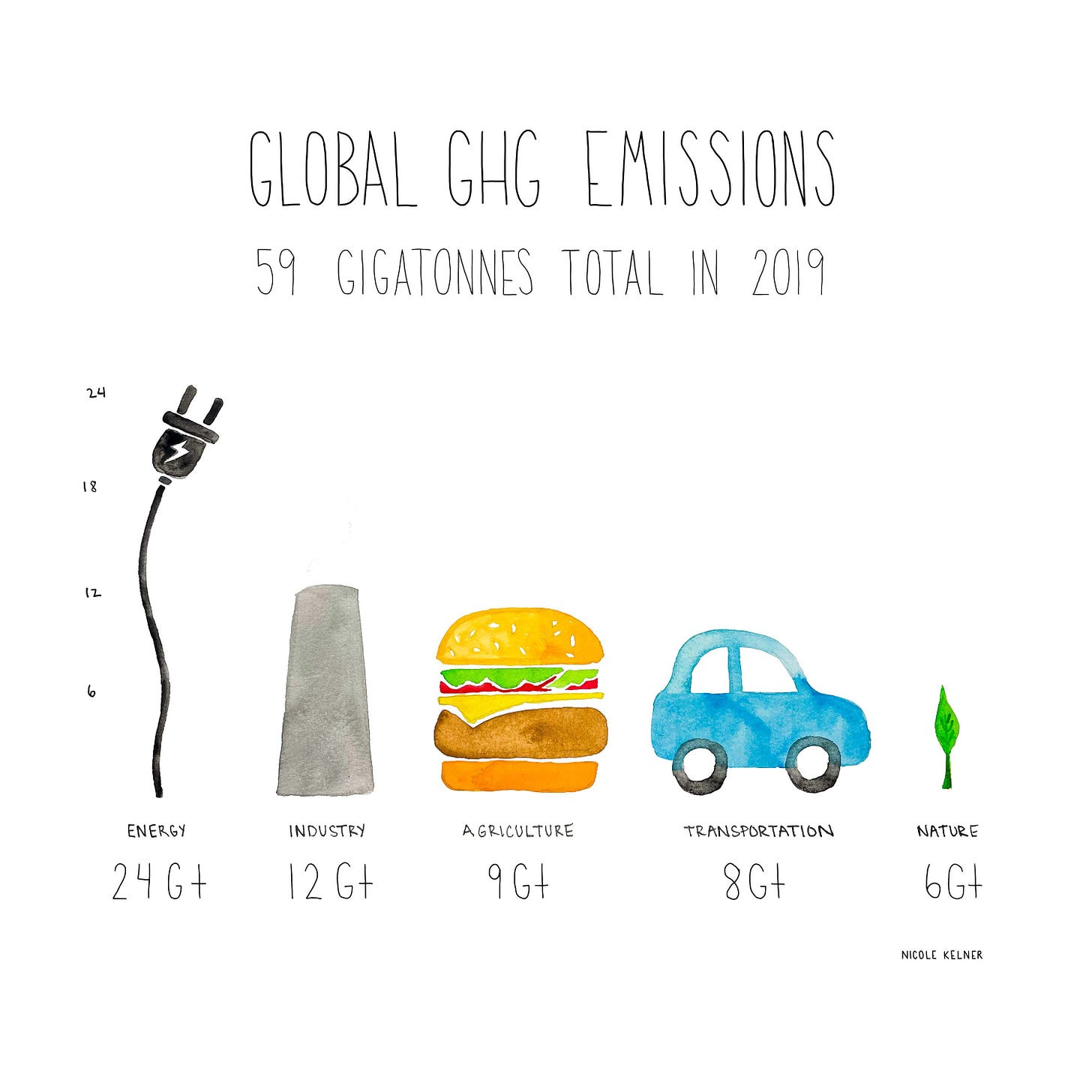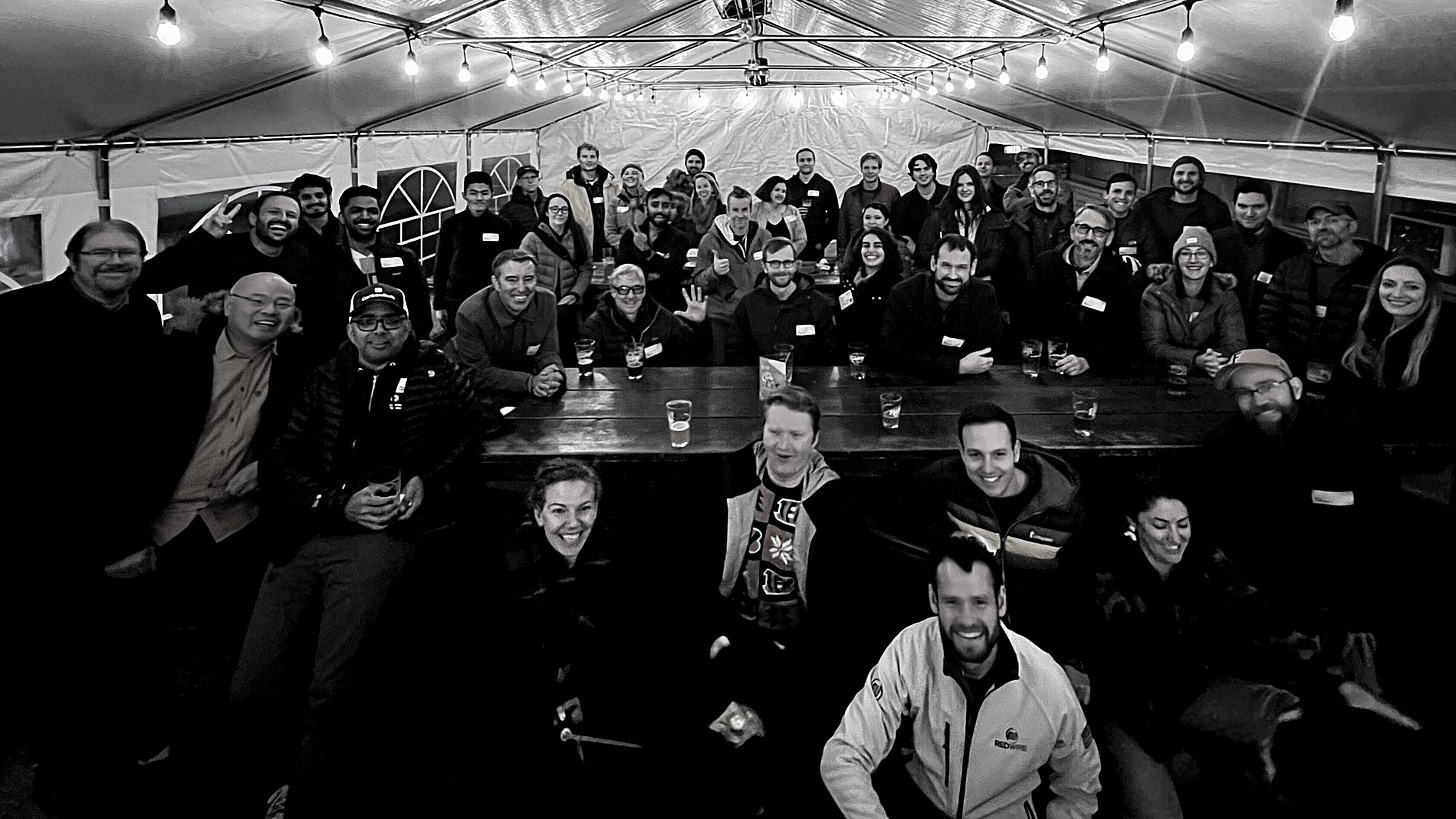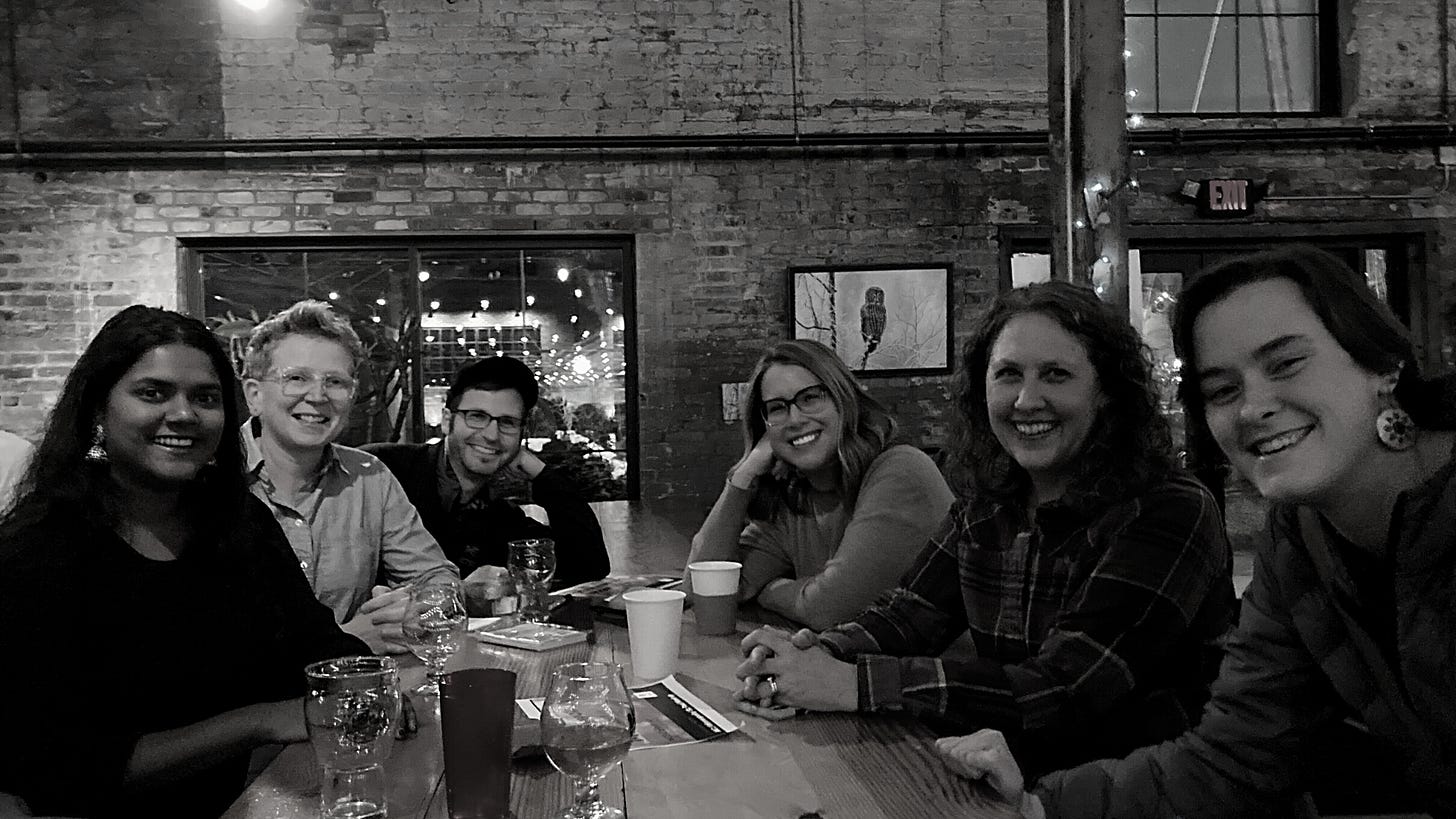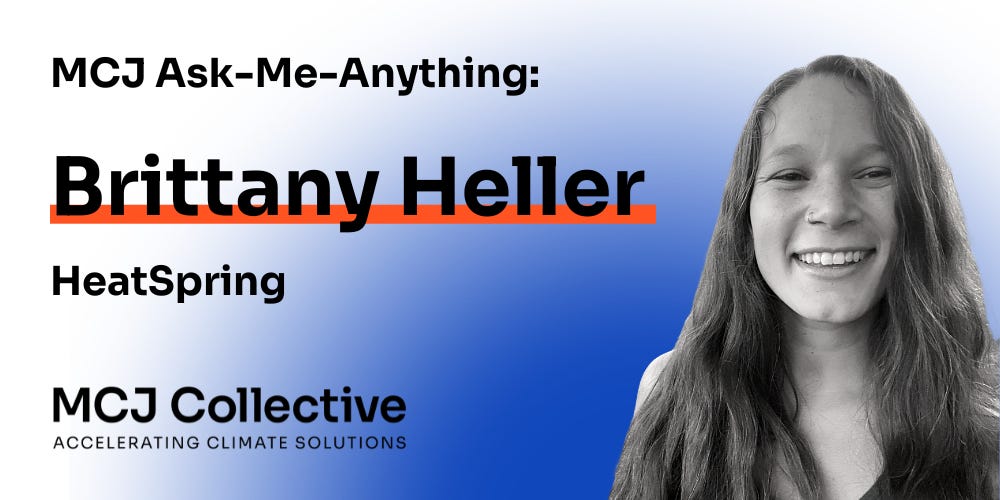Climate Incentive Programs Have a Digital Infrastructure Problem
by Jeff Coleman, founder & CEO of One Billion Machines
The IRA is our golden opportunity to meet the challenge of the climate crisis - but success will require, among other things, a rapid effort to build new digital infrastructure.
I have relished the infusion of joy, determination, and hope the IRA has brought to virtually every corner of the climate movement. To quote the guy who signed it into law: this is a big f-ing deal. Now, as we transition from celebration into implementation, I’ve started to think more deeply about the work I know best: the marketing, outreach, and education efforts required to electrify our homes equitably and at the scale of the problem. And, well… we’ve got some things to figure out!
Earlier this year, I founded One Billion Machines to focus on addressing consumer barriers to residential building electrification. Before that, I spent seven years as Vice President of Outreach at GRID Alternatives, one of the biggest implementers of climate incentive programs in the U.S. My brilliant former colleagues will be critical sources of knowledge and best practices as this work grows over the next few years. For my part, I hope that sharing what I’ve learned in bringing these programs to scale will help illuminate some obstacles that could prevent us from realizing the potential of the IRA.
Here’s an incomplete list of what’s been bouncing around in my head since that fateful moment in July when the alert hit my phone:
“In stunning reversal, Joe Manchin signals support for climate bill.”
It’s too hard to do the right thing.
This is the big overarching problem we all need to chip away at. The process of electrifying our lives is a daunting journey for consumers, requiring complex math, navigating bureaucracies, finding and coordinating contractors, successfully applying for financing, and more. Simply making things cheaper and affordable is not nearly enough. In California, for example, the costs of signing up a qualified household for our free solar programs have always tracked closely to the customer acquisition costs of the for-profit solar industry. There’s no brilliant consumer marketing campaign that can overcome this. Rather, there are underlying structural and systemic barriers that we need to address to make electrification easier and more equitable.
Assuming a well-incentivized market will eventually make electrification affordable for most people, and that we can build the physical infrastructure to support the transition, the biggest remaining barriers will fall into three categories: political/regulatory (e.g. gnarly permitting processes); technological (I see you, 120V induction ranges!); and “soft” infrastructure (the human and digital systems and structures that will enable us to scale). The latter is where my interests and expertise overlap with what’s needed, and while workforce development is a critical challenge that I care deeply about, digital infrastructure has received far less attention and investment to date, so I’ll focus on that here.
Simply put, we do not have the digital infrastructure we need to electrify 120 Million+ households in the U.S.
Buying a heat pump should be easier than buying a home.
We have come to expect frictionless experiences, even for highly complex transactions like buying a home. The digital infrastructure that enables this is invisible, but it has been built through decades of innovation and billions of dollars of investment. Inserting incentives - and in many cases, multiple incentives for a single product or project - into a complex consumer electrification journey creates friction, confusion, and sometimes full-on chaos. This makes it difficult (and costly) to conduct effective marketing, education, and outreach for these programs.
Some ideas for solving this problem:
An “Incentive Infrastructure Collaborative” that helps define and evangelize standards and data structures that enable interoperability among products and programs that leverage, provide access to, and/or educate consumers about climate incentives.
Investment in Data + APIs. We need to prioritize investments in core digital infrastructure and capacity-building, not just the consumer-facing products that promise to make electrification easy. I’ve spoken with dozens of startups focused on one or more big consumer pain points, and every single one has identified this missing digital infrastructure as a major barrier to scaling their solutions. In full transparency, this is the area where my team and I are focusing much of our work, and we hope to make a big dent in this problem in the year ahead.
Big tech companies should take an approach similar to their work on elections, natural disasters, and the COVID-19 pandemic, and invest in tools and features that leverage their vast resources, data, and share of attention to help consumers navigate the electrification journey.
Open Source Whenever Possible. While we don’t need everyone to give away their core IP, a true “wartime effort” to address these challenges should include an unprecedented amount of transparency and collaboration amongst product folks, designers, engineers, marketers, and operators across the space.
Digital Tooling. Where open source doesn’t make sense, consider how you can contribute by building and sharing things like microservices, UI component libraries, and other internal tools that might help other teams move faster and avoid reinventing the wheel.
This list is far from complete, and I’m sure folks in the MCJ community are already working on important and impactful solutions to a lot of these challenges.
Without a broad, comprehensive, and coordinated effort to address these barriers, I believe we will fail to realize the transformative potential of the IRA and lose critical years in the race to decarbonize. Still, thanks largely to the relationships and knowledge I’ve gained through communities like this one, I am steadfast in my optimism and belief that we can do this.
✍️ The Draw-down
Weekly climate art by our MCJ Artist-in-Residence, Nicole Kelner.
🍿 The Lean Back
Learn about Climate Finance Solutions in the latest Pique Action film.
🎙My Climate Journey Podcast
👨💻 Cody caught up with Jonathan Strauss, CEO and co-founder of Climate Draft, about his journey from mainstream tech into progressive political work and then into climate, the community-based origins of Climate Draft, and what he's learned as he's helped thousands of people take their first step into exploring climate-related work.
🦠 CEO and co-founder of MicroByre, Sarah Richardson, shares how her company domesticates novel bacteria and uses biology to produce chemicals that can supplant petrochemical production methods.
🚚 Yin spoke to Larry Coons, a trucker with over a decade of experience about what it’s like to be a long-haul driver, some general frustrations and stressors of the job, his views on electric trucks, and his experience working on some self-driving programs.
✨ Highlights
👩💻 Climate Jobs
For more open positions, check out the #j-climatejobs channel in MCJ Slack as well as our job board featuring 76 MCJ portfolio companies and over 500 open positions.
Analytical Chemist and Mid-Level Designer at Air Company (Brooklyn, NY)
Business Development Associate at Greenwork (Remote/San Francisco, CA)
Cell Line Development Engineer and Pilot Plant Bioprocess Associate at Hoxton Farms (London, UK)
Head of Carbon Solutions (Remote) and Plant Care Associate (San Francisco, CA) at Living Carbon
Director of Sustainability Partnerships role at Muir.ai (Seattle, WA)
Senior DevOps Engineer and Senior Data Scientist at Overstory (Remote)
Food Scientist and Product Manager at Tender (Somerville, MA)
Sales Ops Lead and Sales Development Representative at Waterplan (U.S)
Proposal Manager at WeaveGrid (Remote)
Senior Calibration Engineer at YardStick (Oakland, CA)
🗓 January Events
Click the event title for details & RSVP info. For more climate events, check out the #c-events channel in MCJ Slack.
☀️ AMA with Brittany Heller: Brittany has worked in a variety of roles in the solar industry since 2015 and currently serves as the Director of Program Management at HeatSpring. Stay tuned for an upcoming Skilled Labor Series with Yin Lu! (1/11)
🤝 Career Transitions Meetup: If you are thinking about transitioning to work in climate, join us for an hour of learning and networking. Already working in climate and want to give back to the community? Join us and lend your experience. (1/11)
🔋 Early Career Meetup January: Guest speaker will be Douglas Onyango, a battery manufacturing engineer at Rivian. (1/11)
👋 Community Welcome Call: Connect, share and learn with MCJ team and community members. (1/12)
🏳️🌈 Out in Climate Inaugural LA Chapter Meetup: Out in Climate is a new non-profit dedicated to building a community for LGBTQ+ professionals. Their mission is to foster networking, community-building, and mentoring, and to help connect folks with opportunities and resources in the climate space. More information here.
👭 Women in Climate Meetup: Monthly meetup for women who work in, or want to work in, climate. (1/25)
🎨 Climate Art Workshop: This workshop can be helpful for anyone in the climate ecosystem to start thinking about how to communicate more effectively on their website, social media, and general marketing. At the end, we’ll have time for a Q&A with Nicole on climate art. (1/31)
MCJ Climate Voices is a free weekly email curating news, jobs, My Climate Journey podcast episodes, and other noteworthy happenings in the MCJ member community.
💭 If you have feedback or items you’d like to include, feel free to reach out.
🤝 If you’d like to become an MCJ community member, apply today.


